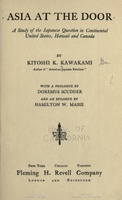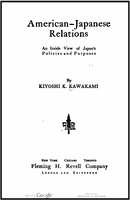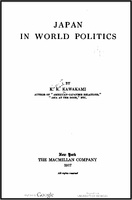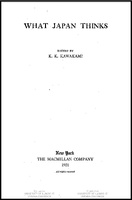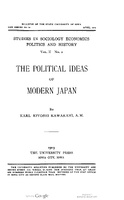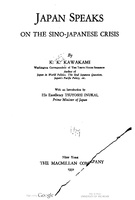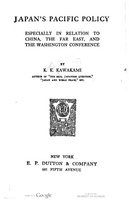Karl Kawakami
Kiyoshi "Karl" Kawakami (1873-1949) was a Japanese writer, activist, and socialist. He wrote extensively on immigration and Japan in global politics. Kawakami was born in Yonezawa, a rural town in northeastern Honshu. He moved to Tokyo at 15 and there was influenced by modernization. He chose his English name “Karl” after Karl Marx who he admired (Japan in world politics vii) He left Tokyo to move to America in 1901. While there, under the instruction of Benjamin F Schambaugh, he obtained a master’s degree in political science at the State University of Iowa, present-day University of Iowa, in 1902 (The University of Iowa holds the Kawakami archives.) His book The Political Ideas of Modern Japan was based on his master’s thesis.
In 1907 he married Mildred Clark of Momence, Illinois. He gradually accumulated fame as a journalist writing for the North American Review, Independence, and New England Magazine. His articles and books specialized in migration and Asian affairs. He wrote extensively about immigration laws targeting Japanese migrants. His Asia at the Door (1914) includes his personal views of the discriminatory accusations aimed at Japanese migrants in the United States. He emphasized how Japanese migrants were uniquely suited (in contrast to other immigrant populations) to adapt to American society. (Lee 294) He was a vocal supporter of the Japanese position in the post-WWI international order. He also wrote about Japanese immigrants’ achievements in science and technology (an area considered exclusive to whites at the time) such as in Jokichi Takamine, A Record of His Academic Achievements (1928) who was a successful chemist and entrepreneur. Such writings emphasized Japanese compatibility with the civilization of “advanced” countries.
He wrote to defend Japan’s imperialism in Asia, however, different than his counterparts in Japan, he did so with American audiences and viewpoints in mind. He linked resentment and fear of Japanese migrants in Mexico and South America to growing fears of imperial Japan’s place in the world and sought to alleviate those fears in language tailored to American audiences. He sought to link Japanese imperialism to American national interests while trying to end discrimination against the Japanese immigrant community. His views were challenged by Chinese communities in the United States who disagreed with Kawakami's endorsement of Japan's invasion of Manchuria and imperialist goals.
His Japan Speaks: On the Sino-Japanese Crisis was responded to by Chih Meng, the Associate Director of the China Institute in America, in China Speaks: On the Conflict Between China and Japan. Each demonstrated different perspectives on Japan’s invasion of Manchuria and demonstrate how world conflicts put the immigrant communities, already discriminated against, in challenging situations. Moreover, Kawakami in attempting to assert the "acceptable" and "desirable" qualities of the Japanese to America did so at the expense of other immigrants including Chinese immigrants.
On the day of Pearl Harbor, December 7th, 1941, Kawakami was taken to an FBI office in Washington and detained on suspicion of working for the Imperial Japanese government (Komori 220) He did not appear in the journalism world again until the late 1940s. He died in 1949, and his last writings insisted that Japan should declare permanent neutrality under the guidance of the United States and the United Nations. (Lee 307)
Bibliography
Komori, Yoshihisa. Arashi ni kaku: Nichibei no hanseki o ikita janarisuto no kiroku [A record of a Journalist Who Lived a Half-century in Japan and the United State]. Mainichi Shinbunsha, 1987.
Lee, Seok-Won. “Kiyoshi Karl Kawakami and Japanese America between the Two World Wars.” Japanese Studies 37, no. 3 (September 2, 2017): 289–310. https://doi.org/10.1080/10371397.2017.1374817.
